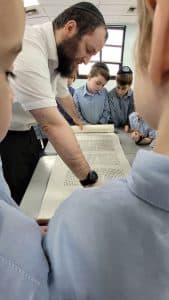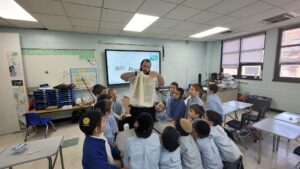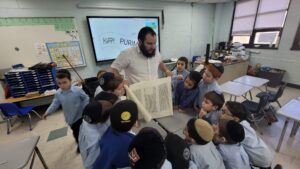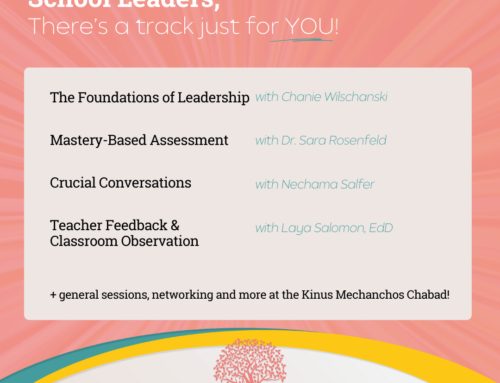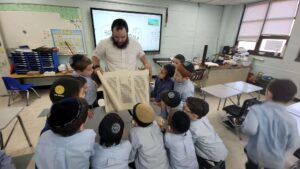 Meet the Chinuch Shluchim: Rabbi Yisroel Raices, first-grade teacher at United Lubavitcher Yeshiva Crown St, follows in his grandfather’s footsteps, remembers a kind gesture of a parent, and shares 3 teaching tips.
Meet the Chinuch Shluchim: Rabbi Yisroel Raices, first-grade teacher at United Lubavitcher Yeshiva Crown St, follows in his grandfather’s footsteps, remembers a kind gesture of a parent, and shares 3 teaching tips.
This week: Rabbi Yisroel Raices, a first-grade teacher at United Lubavitcher Yeshiva Crown St. in Crown Heights, shares the importance of first grade as a stepping stone to grade school and how to keep Chinuch exciting.
Can you share a little of your journey to becoming a teacher?
Teaching is in my DNA. My grandfather Rabbi Yosef Bentzion Raices OBM was a well-known Kriah-stage Rebbi for many children. He came to the United States as a bochur after escaping Russia and spending some time in a refugee camp. After getting married, he became a first-grade teacher in Oholei Torah for many years. When things got difficult at one point, he asked the Rebbe about going into a different field. The Rebbe answered, “אין חינוך האסטו מצליח געווען – you are successful in education.” He eventually moved to Lubavitcher Yeshiva Ocean Parkway, where he taught until a few years ago. He passed away in Iyar 5780.
My father is a teacher as well. He was my teacher for four years in Postville, Iowa. My own teaching journey began when I finished Smicha at age 21. I became a teacher’s assistant in Oholei Torah and observed different teachers for three years. I also completed the MEF’s Teacher Induction Program, and other teaching courses, before taking on full-time teaching in 5776-7.
What is your favorite part of teaching?
Showing or teaching the boys something new and exciting. If they are excited to learn or see it, I am just as excited to show and teach it (and vice versa, of course)! This past Chanukah, I had a 3D printer print a dreidel for each boy. As you can imagine, it was very exciting!
How did your teaching evolve from when you started?
When I was still an assistant, in the year before transitioning to full-time teaching, I spent most of the year and the summer learning teaching techniques and classroom management tips. First from Rabbi S. Filler in Oholei Torah and then from Rabbi Y. Katz in ULY. In my first year of teaching, I tried to do everything but quickly realized that doing a bit of everything would get me nowhere. I slowed down and from that point on, I took on one big thing each year and incorporated it completely. As the years went on, I became more and more confident about my teaching.
Teaching can be such a demanding career. When do you feel the hard work is worth it?
As a teacher, it is heartwarming to see my students’ tremendous growth and development from the beginning of the school year to the end of first grade. Their transition and accomplishments give me a sense of joy and nachas. First grade serves as a crucial foundation for elementary school and it is a pleasure to witness my students take these first steps.
Are there any memorable moments that stand out?
The personal relationships I build with my students and their families are really special. Last year, my then 4-month-old baby had a medical emergency that made me miss a day of school. B”H, he recovered but when I returned to the classroom, I explained what had happened to the boys in an age-appropriate way. One of my students went home and told his mother and without our asking for any help, she brought my family supper to help us during this tough time. It was a small act, but it really touched me that my students’ families can care so deeply.
Another thing that stands out is that in my second year of teaching, I had a boy who didn’t like school, and from the very first day, would tell me that straight out. He was a good boy, but he would come every day with a sour face and say he wanted to go home. Around Chanukah time, I realized that the only thing I could do was be really nice to him. Every morning I would say, “hi, I’m so happy to see you. We are going to have a fantastic day.” I would smile at him, but he still said that he hated school. I did this every day, and by the time Pesach came, he began liking school.
Just my greeting him every morning had a big effect on him. It also empowered me in my teaching. I realized that you’re with the boys for eight months and could really have an effect on them just by drilling in that they are having a great time, that they are good boys and not troublemakers, and that they want to learn. Saying it to them again and again will change their perspective toward school.
What is a Chinuch challenge you face?
Being organized for me can be challenging, and I demand organization from my students. If I don’t clean my own desk every week, it quickly becomes a mess and I’ll have a hard time finding what I’m looking for.
Do you have any hobbies outside of teaching?
I recently got into baking sourdough bread and am a bit tech-savvy. I don’t code or write software, but many fellow teachers will ask me to help them with their computers or phones. I also like to fix things. I recently discovered a passion for painting and drawing. My inspiration for exploring art is Rabbi C. Springer, who used to teach in Oholei Torah. I’m still learning and it takes a lot of patience and mental effort to create something nice but when I put myself into it, sometimes I can create a masterpiece. I also like to play some music. I can play a bit of keyboard, and a bit of clarinet, but I don’t consider myself to be a master of either.
What program is most used on your computer?
Microsoft Excel. I use it to mark and log information. Formulas make using Excel easy, fun, and intuitive.
Can you share a teaching tip?
1. How you operate on the first day of school will have a major impact on your ability to manage your class, the respect your students will have for you, and your general ability to teach that year.
2. Be open to listening, whether it’s advice from another teacher, an assistant, or even your own students (as Gemara Makkos 1a says that we learn from our students most than anyone). Never be embarrassed to admit mistakes, which most new teachers find hard to do. On my first day of school, I make sure the boys know that I am a human and I make mistakes.
3. It is not always easy for a teacher to share with parents that their child is struggling in the classroom. Teachers may prefer to hold off on sharing concerns in the hopes of putting in extra work in the classroom to bring the child up to speed. However, withholding information about a child’s academics is only kicking the can down the road and can cause even bigger problems later on. It is critical for teachers to be open and honest about how each child is doing and to keep parents in the loop from the get-go.
What would you tell someone who is considering making Chinuch their Shlichus?
Teaching can be mentally draining and exhausting. The sense of responsibility is enormous! There is a weight of responsibility for each child, from their day-to-day health and well-being to their long-term success. It all weighs heavily on your shoulders. This, and classroom management, may make your first attempts at teaching very challenging.
I’d recommend to start with training. Take every available course and observe classrooms. If at first, you feel like your teaching is a failure, remember the end goal: teaching is the most rewarding job even when it is the most challenging.
Also, if you’re planning on being a teacher, don’t think that you will be a teacher from 8:30 AM – 4:00 PM. When you walk down the street and meet a student, he looks up to you as a role model. You are a teacher every moment of every day – morning, nighttime, Shabbos, and vacation. You are always and forever a Mechanech.
